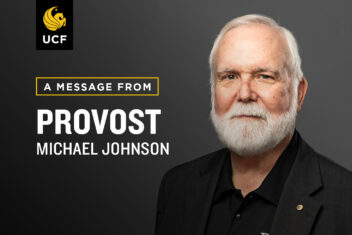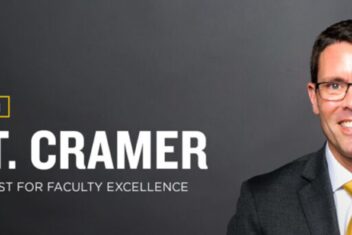Four of every 10 college students reported not registering for a course due to the high cost of textbooks and other required materials, according to a 2018 survey by the Florida Virtual Campus. Faculty from across UCF have worked with the Center for Distributed Learning (CDL) to cut student costs through the Affordable Instructional Materials (AIM) Initiative.
The university-wide effort — which has helped UCF students save more than $11 million since 2016 — empowers faculty members to identify and utilize free and reduced-cost course materials, including open educational resources (OER), library-sourced materials, First Day, Affordability Counts and other programs.
One key component of the AIM Initiative is the First Day program. This inclusive access partnership with the Barnes & Noble at UCF bookstore allows students in eligible courses to receive discounted pricing on textbooks and materials. Students can also defer payment through their student account to alleviate the stress of waiting for financial aid to pay their bill.
“Starting in Spring 2019 with the First Day pilot in Dr. Carolyn Messiah’s marketing class where we saved students more than $60,000 in one course, we have seen exponential growth,” says Dr. Wendy Howard, director of CDL’s Pegasus Innovation Lab, which coordinates the AIM Initiative. “The total student savings in just two years is $5,952,208, which has been generated by roughly 10 percent of total UCF course sections.”
In total, more than 117,000 students have taken advantage of the savings. But students can only save through First Day if faculty members enroll their courses in the program.
Another significant way faculty members reduce costs is by using Open Educational Resources (OER), which include openly licensed text, media and other digital assets, as well as Library-Sourced Materials, which are e-books or other resources free to students through UCF Libraries. By using these materials in their classes, faculty members allow students to pursue a course without the worry of having to pay for a textbook. Since 2016, approximately 55,000 students have saved more than $5.5 million thanks to these free materials in 763 course sections. This total also includes courses taught by faculty who do not require a textbook, data which was first tracked in 2019.
Rounding out the AIM Initiative is Affordability Counts. This strategic partnership between the State University System of Florida and the Florida College System recognizes faculty who advance affordability in their courses by requiring materials that are less than or equal to $20 per credit hour, per course. Faculty who qualify can submit their course for review and be added to the list of low-cost courses on the program’s website.
The collective financial impact of these AIM programs can be felt across campus. And this success can only be attributed to the faculty members who work to ensure students don’t have to suffer in the quality of their education because they can’t afford a book. To celebrate their achievements, the annual AIM High event, hosted by CDL in conjunction with UCF Libraries and the Division of Student Learning and Academic Success, recognizes all UCF faculty members who have worked to keep textbook and materials costs low for students in the past calendar year.
For the 2021 event, which took place Feb. 17, President Alexander Cartwright presented AIM High Impact Awards to Annabelle Conroy, a lecturer in the School of Politics, Security and International Affairs, and to the members of the UCF Department of Physics, which adopted OER for courses in physics, astronomy and physical sciences.
Conroy has taught 26 course sections using OER, and 484 students enrolled in those sections have saved an estimated $52,000. A recent survey of her students revealed that 78 percent of the respondents had not previously purchased a textbook at least once because of cost.
“[OER] provide flexibility because materials can be updated immediately and customized to a particular class and objectives,” Conroy said. “Because materials are free, I can use a wide variety of sources and media to provide information and illustrate concepts and cases [that make] the classes more engaging.”
Access to free materials has become more critical as students face added financial challenges during the COVID-19 pandemic. “Some textbooks, whether renting or purchasing, are fairly expensive,” says Tyler Williams, one of Conroy’s students. “Having one less class to worry about financially was a relief [this semester].”
The Department of Physics, which collaborated with CDL staff and instructional designers to incorporate OER materials into courses, worked together to help save their students more than $232,000 during the Fall 2020 semester alone. But they aren’t stopping there. They plan to continue incorporating OER into more courses, which will not only keep their materials flexible, but also contribute to student access and success.
“[OER] provides opportunities for [faculty to take] more control of their instructional materials, tailor them according to their student needs, and also collaborate with other instructors,” says Dr. Eduardo Mucciolo, chair for the Department Physics, “not only at UCF, but elsewhere.”


